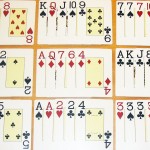
Poker Geeks
For most people, poker still conjures up images of dodgy back-street games where a winner might be lucky to leave with his bankroll missing, plus a finger or two too.
On the silver screen, meanwhile, poker is still played mainly by tough guys – James Bond destroying the bad guy armed with nothing but a sharp tuxedo and a defibrillator the most recent example.
The reality, at least over the past 15 years, is a little different. Since the online poker boom of the mid-2000s, the game has been slowly taken over by a generation of maths geniuses and college dropouts. Not for them is rocking up to a televised poker table in a dinner suit – a hoodie, shades, and a nervous disposition is enough.
There are arguments raging about whether the geeks are good for the game. (After all, who would you rather tune into to watch on TV playing the game – James Bond or Q?) That said, many pros are leaving the game as it’s become “too tough”. And it’s the geeks who are taking over. Here are five reasons why when it comes to poker, the geeks are very much inheriting the earth.
There’s No Pressure To Turn Up

Joe McKeehen
We’re not for one minute suggesting that geeks can’t handle the social situation of a cardroom. But many of today’s poker millionaires are venturing nowhere near a live casino, unless it’s for the yearly World Series of Poker in Las Vegas (last year’s winner took $7.68 million). The online Vegas of their laptops is where they ply their trade.
Online players can hide behind aliases, trade insults via the on-screen chatbox, and try out outrageous bluffs and gambles they wouldn’t dare do in a “real-life” situation.
Oh, and there’s no dress code online, either: just wake up at 11pm, flip open the laptop and win a few thousand, all without ditching the PJs. And, there’s plenty of choice with some big names like 888 and Sky competing for your business, along with dozens of other online poker sites..
It’s a Maths Game

Chris “Jesus” Ferguson
Once upon a time, poker was a simpler affair: you played the player, not the cards, and a basic grasp of odds was needed in most situations.
The maths geeks actually appeared just before the online boom began. In 2000, Chris “Jesus” Ferguson, a Computer Science PhD who’d been involved in the early Internet in the late 1980s, won the World Series of Poker main event.
Ferguson was different to the old-school road gamblers. He studied the maths of poker and ran thousands of poker hands through very early analysis software available at UCLA. The maths geek had arrived.
In the past few years, poker analysis software for use at home has appeared. “Heads-Up Display” (HUD) programs ‘sit over’ the online poker game and track your opponents’ gameplay.
Sit ‘n Gos (single-table tournaments played with 9 or 10 players) can now be charted and analysed using dedicated programs like SitNGo Wiz, while cash game players use kit like Poker Tracker to keep tabs on regular players. Terms like VPP (‘Voluntarily Put Into Pot percentage’) and PFR (‘Pre-flop Raise’) are now stats on the monitor. Psychology and bluffing have taken a back seat.
Most HUDs are now banned by poker rooms, but it’s a sign of just how in-depth poker players’ research has come. You can now gauge when opponents raise and how often they do it. You can even hire coaches who will analyse your stats to improve your game. How geeky is that?
The Link To Gaming Keeps Growing

Bertrand Grospellier
The line between gaming and gambling continue to blur. Many pro gamers, like France’s Bertrand “ElkY” Grospellier, went from a very lucrative Starcraft career (and the gaggles of South Korean groupies) to take on the poker tables. Grospellier has now won over $10 million playing poker.
More recently, poker players have started taking to streaming channels like Twitch to broadcast their games. Once a mainstay of pro video gamers, Twitch now boasts dozens of channels from online poker players commentating on their big-money sessions.
There’s No Need to Hit the 9-to-5 Grind

Open-Face Chinese Poker
By the very definition of the word, geeks don’t conform to the mainstream. But they aren’t necessarily losers; they can – and often do – end up millionaires.
They might be obsessed with their chosen profession or pursuit, and might be socially awkward.
If you’re looking for a pastime that caters for all of those foibles, it’s poker. With poker you have no boss, save your backer (if you have one) or the taxman (if you live in a country that still has some archaic attitudes towards gambling). There are no fixed “hours”: you can rock up to a casino cash game at midnight or log on to an online site at three in the morning. And if you want to hit the online forums and discuss the merits of Open-Face Chinese Poker for hours on end, you can do so without risk of ridicule.
Success breeds success, and many of poker’s multi-millionaires are self-confessed geeks. Some might stick their hand up and confess to being nerds. But for them, the money, fame and girls are secondary to improving and beating the game. In poker, the geeks really have inherited the earth.
